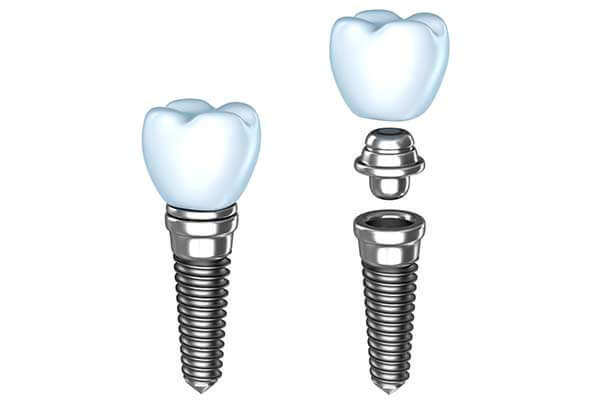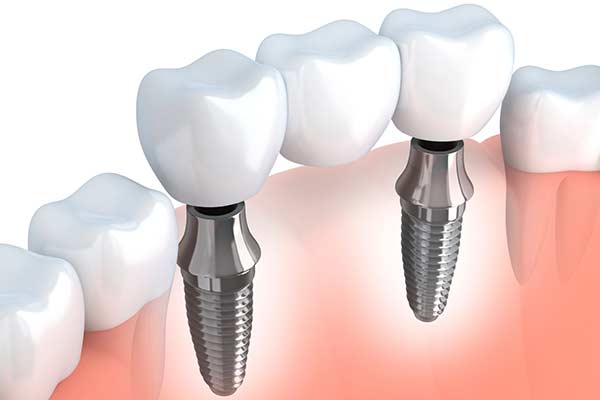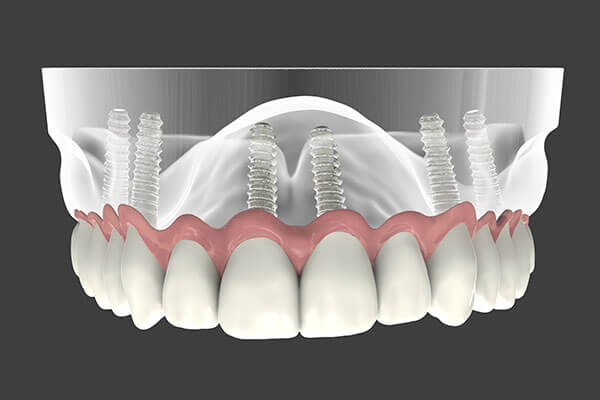Dental Implants in Peoria, IL
Christopher J. Couri, DDS, MS provides dental implants in Peoria, IL. Call 309-674-4148 t to learn more and schedule an appointment.
Dental implants are a durable, long-lasting replacement for your own natural teeth. And just like them, with good oral care, they’re thought of as permanent replacements. No other tooth-replacement option will give you a longer-lasting result.
Implants also help preserve tooth-supporting bone that naturally deteriorates when a tooth is lost. Fused to your jawbone directly, implants not only replace your external tooth, they’ll strengthen your jawbone as well as the bone that surrounds it. Loss of bone is one of the major hidden consequences of losing teeth. Implants have a documented success rate of over 95%, which is significantly higher than any other tooth-replacement option.
Implants have three different parts: the artificial tooth root, a small, screw-shaped titanium post, that acts as a base for the replacement tooth; a metal frame that is attached to the base, designed to hold an artificial tooth; and the artificial tooth itself, which fills any gaps between your teeth.
The surgical procedure to place an implant is quite minor and routine, requiring only local anesthesia in most cases. After a healing period, the implant is topped with a lifelike crown that’s custom-made to match your existing natural teeth.
Different Types of Implants
You’ll find there are four main kinds of implants.

Single Tooth Implants
The most typical implant type is a single tooth dental implant. When you have one tooth missing, a single implant is inserted into the bone to replace the root part of that tooth; a crown then goes on top to simulate an actual tooth. This treatment choice has the highest success rate, making it the best long-term investment for replacing a single missing tooth. Even if the initial cost is slightly higher than other options, it is the most cost-effective solution over time. An implant will never decay or need root canal treatment, and feels just like the tooth that was there. The implant replaces your missing tooth without any damage to your surrounding teeth. That single implanted tooth is just like your natural tooth in terms of appearance and function.
The Benefits & Importance of Dental Implants
Want to know more about why you should choose dental implants?
Learn More About the Benefits of Dental Implants
Implants to Replace Multiple Teeth
When you have more than one tooth missing, implants provide an ideal replacement. Rather than one implant replacing each missing tooth, implant teeth can act as supports for fixed bridgework to replace missing teeth. For example, if you are missing three teeth in a row, we can place two implants, one on either side of the gap, and a crown in between that has no implant underneath. You won't need to use any of your remaining natural teeth as bridge supports, which could weaken them and make them more susceptible to decay.

Implant Supported Dentures
Implants can even make removable dentures more comfortable, effective and healthier to wear. Traditional dentures rest on the gums and put pressure on the underlying bone. This accelerates bone loss so that the jaw shrinks and the dentures slip, particularly on the bottom. Today, dentists can attach a removable implant supported denture, transferring that pressure into the bone structure rather than the bone surface. This prevents the dentures from slipping while you eat and speak, and preserves the bone directly beneath them.
Implant Care and Maintenance
Caring for your implants is simple. Use the same good kind of dental hygiene that you do for your own natural teeth. This means:
- Brush them and floss twice a day
- Schedule your regular month check-ups and cleanings with your dentist
There are only two ways an implant can lose attachment to the bone and fail once it has successfully fused: poor oral hygiene or excessive biting forces.
Poor oral hygiene and/or a lack of regular cleanings can lead to a destructive bacterial infection called peri-implantitis. Flossing and brushing your teeth on a daily basis, along with regular professional cleanings, can prevent this.
Excessive biting forces can come from:
- Clenching or grinding your teeth - if you have a habit of grinding or clenching your teeth, a night guard will be recommended to protect your implants
- An insufficient number of implants to handle the forces generated by your bite - receiving the correct number of implants can prevent this from occurring.
After all, implants are a long-term investment in your smile, your health and your well-being, so it's best to protect your investment.
Call 309-674-4148 to schedule an appointment.
Frequently Asked Questions About Dental Implants
What are the different types of implants?
Implants are commonly used in these four ways, as:
- Single Tooth Dental Implants
- Implants to Replace Multiple Teeth/Implant Supported Bridges
- Implants to Replace All Teeth
- Implant Supported Dentures
Implants can be expensive. Are they worth it?
Yes! A dental implant has many benefits that a bridge or denture alone does not offer. While those options do cost less, nothing tops a dental implant for bite strength, the health of your jaw, and the attractive, natural appearance of an implant. Be sure to consider each of these facts when deciding on getting an implant.
What are the different types of implants?
The actual cost is determined by a number of different factors, including:
- Location of the tooth being replaced, and ease of access to the site
- Other conditions present for the patient, such as gum disease
- Insufficient bone density in the jaw requires bone graft before implant
- Number of implants
- Materials used